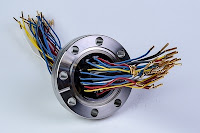 |
Electrical Vacuum Feedthrough
(Epoxy) |
A
vacuum feedthrough is designed to pass matter or energy, without leakage, from the outside of a vacuum chamber to the inside. The term vacuum feedthrough is often used interchangeably with
electrical feedthrough,
glass feedthrough,
ceramic feedthrough,
epoxy feedthrough and
hermetic feedthrough. There are of course differences, but they all provide the same function - provide a leak-tight seal between the inside and outside of a vacuum chamber.
Epoxy, glass or ceramic feedthroughs refer to the materials used to seal the conductor, tube, or fiber optic cable from the vacuum/process connection. Hermetic feedthrough refers to the device's nature of being airtight or vacuum tight, such as "hermetically sealed".
 |
| Fiber Optic Vacuum Feedthrough |
Vacuum feedthroughs are used for 2 primary functions: delivering energy (usually in the form of electricity or light pulse); and for delivering matter in the form of liquids and gases.
Electrical feedthroughs use electrical conductors such as wires to deliver electricity inside the vacuum chamber.
Liquid and gas feedthroughs use metal tubes or fiber optic cables to introduce fluids or light beams.
 |
| Liquid & Gas Vacuum Feedthrough |
There is debate over what sealing material provides the best over-all performance-to-cost benefit. Glass to metal seals and ceramic seals are ubiquitous and provide very good sealing properties, but they are expensive and difficult to customize, making prototyping and small production runs challenging. Early epoxy seals were limited in temperature range and were known to outgas, but new, modern epoxy compounds have been developed to perform as well as glass to metal and ceramic.
Modern epoxy feedthroughs can now achieve vacuum up to 10
-8 Torr, temperatures up to 200°C continuous (300°C intermittent), and meet NASA's outgassing requirement of <1.0% Total Mass Loss (TML).
For more information, contact
BCE by visiting
http://bcemfg.com or call (510) 274-1990.


